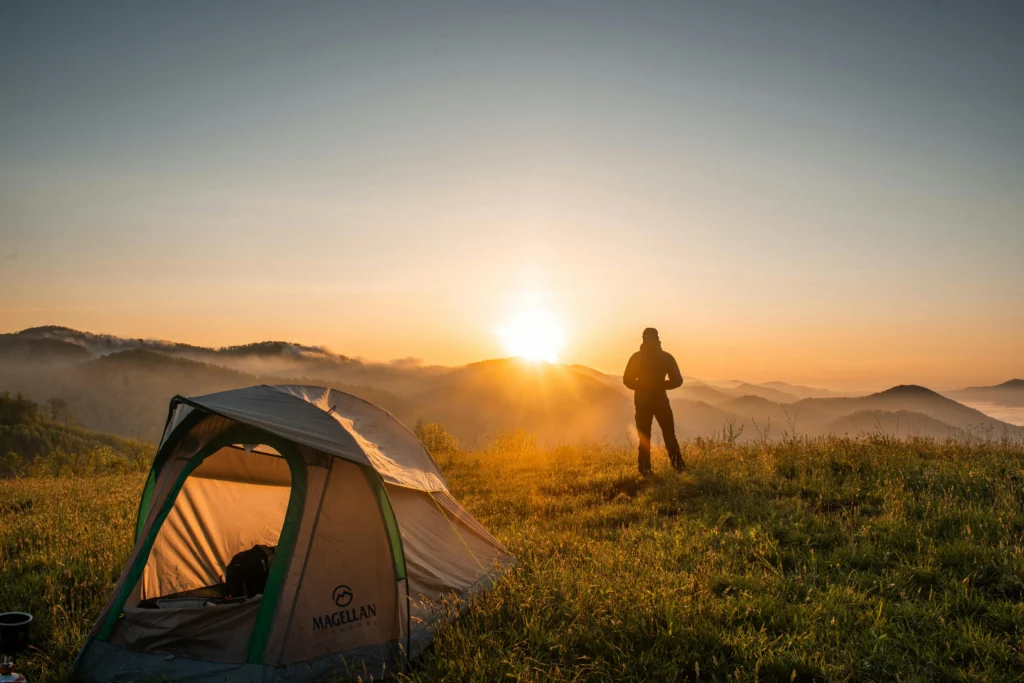Camping is more than just an outdoor adventure or a fun getaway; it can have profound psychological benefits that contribute to mental well-being and personal growth. As more people seek balance in their increasingly fast-paced lives, the benefits of camping as a therapeutic activity are becoming clearer. Whether in the form of a weekend escape or a longer stay in the wilderness, the act of disconnecting from technology and immersing oneself in nature can have lasting positive effects on the mind and body. In this article, we explore the powerful connection between camping and psychology, highlighting the mental health benefits, therapeutic techniques, and personal development that come from spending time in the great outdoors.
The Psychological Benefits of Camping
Camping offers a range of psychological benefits that contribute to better mental health and overall well-being. These benefits stem from the natural environment, the physical activity involved, and the opportunity to disconnect from everyday stressors. Let’s explore some of the most notable psychological benefits of camping:
1. Stress Reduction and Relaxation
One of the most immediate psychological benefits of camping is stress reduction. When people spend time in nature, surrounded by calming landscapes and fresh air, their cortisol levels—the hormone associated with stress—tend to decrease. This is because nature has a soothing effect on the human brain, helping to lower stress levels and promote relaxation. The simplicity of outdoor living, combined with time spent in a tranquil environment, allows individuals to recharge and experience a sense of calm that is hard to achieve in a busy, urban setting.
2. Enhanced Mental Clarity and Focus
Camping offers an opportunity to break free from distractions and daily routines, which can contribute to mental fatigue. By stepping away from constant notifications, emails, and social media, campers often experience improved mental clarity. This disconnection from technology helps individuals to focus on the present moment, leading to increased mindfulness and enhanced cognitive function. The sense of freedom and simplicity that comes with camping can provide a mental reset, allowing individuals to gain better focus and clarity in their daily lives.
3. Improvement in Mood and Emotional Health
Numerous studies have shown that spending time outdoors can have a positive impact on emotional health. When camping, people tend to feel more relaxed, happy, and content. The natural environment encourages a sense of awe and wonder, which can trigger positive emotions and boost mood. Additionally, outdoor activities like hiking, fishing, or simply enjoying nature promote the release of endorphins, which are the brain’s “feel-good” chemicals. These activities help combat symptoms of anxiety, depression, and sadness, providing campers with an emotional lift.
4. Increased Self-Esteem and Confidence
Camping can help individuals build self-esteem and confidence. When people spend time outdoors and face the challenges of nature, they often experience a sense of accomplishment and self-reliance. Tasks like setting up a tent, building a fire, or navigating the trails require problem-solving skills and the ability to adapt to changing conditions. Overcoming these challenges boosts a person’s confidence and self-worth, as they feel more capable and resilient. The independence gained from spending time in the wilderness fosters a stronger sense of personal empowerment.
5. Opportunities for Social Connection
Camping is often a group activity, whether with friends, family, or even strangers. Spending time in the outdoors can strengthen social bonds, foster a sense of belonging, and reduce feelings of loneliness. Group camping activities—such as cooking meals together, sharing stories around a campfire, or exploring nature—create opportunities for meaningful connections and social interaction. For individuals struggling with social anxiety or isolation, camping can provide a safe space for practicing social skills and forming new relationships.
The Role of Nature in Psychological Well-being
The connection between nature and psychology has been studied extensively, and there is growing evidence to support the idea that spending time in natural environments can improve mental health. Nature has a restorative effect on the mind, which is why many therapeutic practices now incorporate outdoor elements. Here are some key reasons why nature plays such an important role in psychological well-being:
1. Restoration and Recovery
Nature has a restorative effect on the brain. According to Attention Restoration Theory (ART), spending time in nature helps to restore mental energy and cognitive function, particularly after periods of stress or mental fatigue. This is why many psychologists and therapists recommend spending time outdoors as part of a recovery process for mental health issues like anxiety and burnout. The natural environment provides a safe, calming space that encourages mental recovery.
2. Mindfulness and Presence
Camping is an ideal activity for practicing mindfulness, a mental state that involves focusing on the present moment without judgment. Being in nature naturally encourages mindfulness because campers are surrounded by sights, sounds, and sensations that demand attention and appreciation. Whether it’s listening to the rustling of leaves in the wind or observing the beauty of a sunrise, camping offers countless opportunities to be fully present and engaged in the moment.
3. Connection to Something Larger Than Oneself
Spending time in nature allows individuals to feel a sense of connection to something larger than themselves. This feeling of interconnectedness can provide comfort, foster a sense of purpose, and reduce feelings of isolation. Nature’s vastness encourages a perspective shift, reminding people of their place in the world and providing clarity and a sense of peace.
Psychological Techniques Used in Camping Therapy
Camping therapy is a recognized form of outdoor psychotherapy that incorporates nature and outdoor activities into therapeutic treatment. Often used to treat individuals with anxiety, depression, or trauma, camping therapy focuses on using nature as a tool for healing and personal growth. Here are some psychological techniques commonly used in camping therapy:
1. Ecotherapy
Ecotherapy is a form of therapy that connects people to the natural world to improve their mental health. Ecotherapists encourage clients to spend time in nature, engaging in outdoor activities such as hiking, gardening, or simply sitting in a peaceful natural setting. The goal is to help clients reconnect with the earth and use nature as a healing force. By being immersed in the natural world, individuals can gain perspective, alleviate stress, and foster emotional well-being.
2. Adventure Therapy
Adventure therapy is a form of experiential therapy that uses outdoor activities like rock climbing, kayaking, and team-building exercises to help individuals address emotional and psychological challenges. These activities require problem-solving, cooperation, and resilience, which can help individuals develop important life skills. Adventure therapy is often used to treat adolescents and adults dealing with issues such as substance abuse, trauma, and low self-esteem.
3. Wilderness Therapy
Wilderness therapy is an intensive form of treatment that involves outdoor expeditions, typically in remote and rugged environments. It is used to help individuals overcome personal challenges, build emotional strength, and improve social skills. Wilderness therapy programs often include group therapy, individual counseling, and outdoor challenges designed to promote personal growth and healing. This type of therapy has been particularly effective for at-risk youth, individuals with behavioral issues, and those recovering from addiction.
Personal Development and Growth through Camping
Beyond the therapeutic benefits, camping also offers opportunities for personal development and growth. The experience of spending time in nature helps individuals build resilience, self-awareness, and self-reliance. By stepping outside of their comfort zone and facing challenges, campers often discover new strengths and abilities they didn’t know they had. The process of overcoming difficulties in the wilderness, whether it’s enduring harsh weather conditions or navigating unfamiliar terrain, fosters a sense of accomplishment and personal growth.
Conclusion
Camping and psychology are deeply connected, with outdoor activities offering numerous mental health benefits. From reducing stress and improving mood to fostering personal growth and resilience, spending time in nature can have a profound impact on psychological well-being. Whether through stress reduction, mindfulness, or therapeutic outdoor practices, the power of nature in healing and personal development is undeniable. As more people recognize the mental health benefits of outdoor activities, camping is becoming an increasingly popular way to reconnect with nature and improve mental health.


Pingback: Camping and Equipment: Everything You Need for Your Outdoor Adventures - mataoutdoors
Pingback: Outdoor Safety: Risks and Precautions - Step into Nature